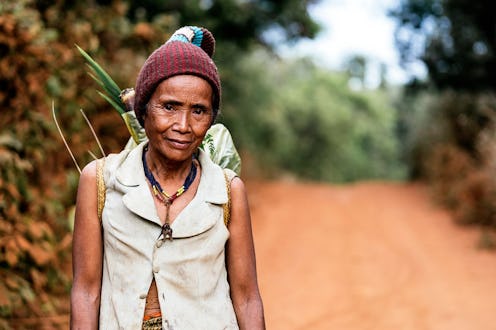Life
The Link Between Gender Equality & Sustainability Proves Powerful Women Are Vital AF

If only Bey was totally accurate when she asked "who run the world?" Because sadly, it's not girls. In a world where climate change is no longer a background issue, but one we must address urgently, more and more research into this topic is beginning to emerge. Well, according to a new study, when women make decisions, less damage is done to the environment.
The study, conducted by the University of Colorado Boulder, was published this week in scientific journal Nature Climate Change. It involved 440 forest users from three developing countries and investigated the way in which groups of people make decisions in regard to land management.
Results for the research suggested that the more women are involved in group decisions about land management, the less negative impact those decision will have on the land. In response to their findings, Krister Andersson, a political science professor and researcher at the Institute of Behavioural Science and senior author on the study, said:
When policymakers think about what to do to increase conservation around the world, gender quotas don't even come up as a viable policy instrument. This study suggests they should. We wanted to know what would happen if you offered financial incentives for groups to conserve and made sure at least half the members were women.
As a University of Colorado at Boulder press release about the study explains, this research comes after previous studies that have "shown that women tend to have a greater affinity for the environment, support conservation measures more and are more concerned than men are about problems of inequality." However, given that women are "often are at a financial disadvantage or are underrepresented in decision-making bodies," the university adds, "they may not have the opportunity to put those preferences into action."
In order to collect their data, the University of Colorado Boulder research team made trips to Tanzania, Peru, and Indonesia, visiting 31 villages near collectively managed forests. Using a tabletop simulation game, the team got a feel for how gender impacted the decisions that each group made about harvesting in their shared forest.
One half of the groups had implemented gender quotas, meaning 50 percent of members had to be women. The other half had no quotas. They also offered financial incentives to a select number of the groups, both with and without quotas, to see what effect that would have.
Nathan Cook, a postdoctoral research fellow at the Institute of Behavioral Science, said more conservation-friendly decisions were made when women step in and there was money on the line. "We found that the groups with the gender quota reduced their harvesting rate far more when the incentive was introduced and also distributed the payments for conserving more equally," he said.
When money was added to the mix, the groups with a gender quota went on ahead and reduced their harvesting by 51 percent, whereas the group with no financial incentive cut its harvesting by only 39 percent. Andersson speculated that financial incentives may have left the women feeling empowered, pushing them to make more planet-friendly choices. He said:
It appears that it is not the gender quota by itself that is making a difference, but rather the combination with the conservation incentive. Maybe women have stronger environmental preferences but having a seat at the table and a payment for foregoing the immediate benefits of cutting down trees empowers them to act.
And the University of Colorado Boulder team are not the only ones to have found a link between female representation and environmental sustainability. The UN has also published findings along the same lines:
Research suggests that women express more concern for the environment, support policies that are more beneficial to the environment and tend to vote for leaders who care about the environment. Evidence from 25 developed and 65 developing countries indicates that countries with higher female parliamentary representation are more likely to set aside protected land areas. A study of 130 countries shows that women are also more likely to ratify international environmental treaties.
When all is said and done, the decisions that have been made with regard to our planet thus far have been really rubbish. Times are changing and maybe the secret to getting the world in better shape is offering the opportunity to all people, no matter their gender, class, race, or whatever, to have a say in the choices made.